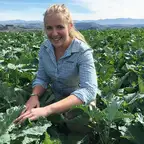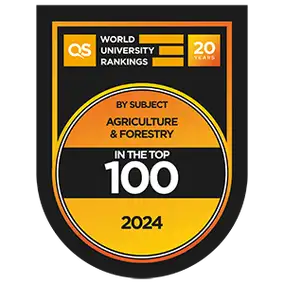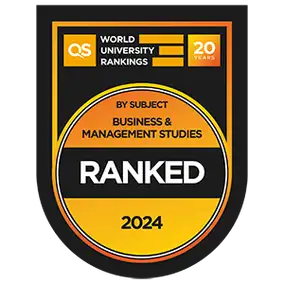Where you can study
International students
International students are not New Zealand citizens or residents.
Specialise in Farm Management for your Bachelor of Agribusiness at Massey
The Bachelor of Agribusiness (Farm Management) prepares you for the demands of the farming business. From strategic to organisational skills, you’ll learn how to build and deliver profitable businesses on a sustainable basis.
Become a multidisciplinary practitioner
You’ll be able to draw from business-related disciplines such as, industrial economics, marketing, supply chain management and finance.
You’ll also gain knowledge in:
- natural sciences
- environmental sciences
- life sciences
- food security and safety
- primary production technologies
- systems and biotechnology.
Put agribusiness into perspective
The discipline of farm management provides the ability to interpret and put into perspective issues affecting farm and agribusiness managers. It offers an understanding of how and why managers make decisions and what impact those decisions have on their business and the wider industry.
Practical experience while you study
Your learning will focus on real-world case studies and will include field trips to provide experiential learning – from talking to and observing farmers.
You’ll gain a huge amount of practical experience. This will include at least 26 weeks of paid employment undertaken in agriculture and related sectors.
A growing, innovative industry
New Zealand’s economy is dominated by agriculture and food. It generates tens of billions in export earnings a year and international demand is predicted to continue to grow.
Relevant international knowledge
Massey’s agribusiness qualification aligns itself with agribusiness industries throughout the world. This ensures you will have the skills and industry knowledge employers want.
A Bachelor of Agribusiness in Farm Management is a good fit if you:
- would like to have a career associated with agriculture or horticulture
- are interested in the business/commercial side of farming
- would like to gain a broad range of skills in agribusiness.
Planning information
If you study full-time, in your first year, you’ll take eight 15-credit courses, making a total of 120 credits.
If you wish to study over two semesters, you should aim for 60 credits per semester. You may be able to take some courses at summer school. Make sure you include courses that are prerequisites for the next level of courses you wish to study.
Capstone course
‘Capstone’ courses are designed to be taken in your last year of study. This relies on you having completed the correct first and second year courses and ties your learning together. The capstone course for this qualification is 119373 Integrative Studies.
Practical work requirement
There is a practical work requirement for this degree, consisting of at least 26 weeks full-time work. This is completed by submission of two reports for assessment. Practical work is normally done during summer vacations throughout the degree. Summer jobs are readily available on farms, orchards and other rural enterprises.
Course planning
Agriculture pathway
Year One
Two courses from:
115112 Accounting for Business
115113 Economics for Business
115114 Finance Fundamentals
And all of:
117153 Introduction to Animal Production in New Zealand
119120 Plants for Agriculture and Horticulture
119180 Introduction to Agribusiness
161140 Agri-Statistics
189151 Principles of Soil Science
247111 Science and Sustainability for Agriculture and Horticulture
Year Two
112248 Food and Agribusiness Value Chains
115211 Business Law
117201 Livestock Production Science
119150 Practicum I*
119281 Decision Tools for Primary Industries
189251 Soil Fertility and Fertilisers
283201 Pasture and Crop Agronomy
One course from:
115112 Accounting for Business
115113 Economics for Business
115114 Finance Fundamentals
One course from:
127242 Introduction to Property Valuation
138255 Applied Engineering in Agriculture and Horticulture Systems
152261 International Business
Year Three
119250 Practicum II*
119358 Farm Production Systems
119381 Decision-Making in Primary Industry
119382 Opportunity Analysis in Primary Industry
119373 Integrative Studies
And four elective courses (two courses must be 200-level or higher of which one course must be 300-level).
*26 weeks of relevant practical work (2 x 13 week blocks of full time work). Work to be completed the summer prior to writing the reports.
Horticulture Pathway
Year One
Two courses from:
115112 Accounting for Business
115113 Economics for Business
115114 Finance Fundamentals
And all of:
117153 Introduction to Animal Production in New Zealand
119180 Introduction to Agribusiness
161140 Agri-Statistics
119120 Plants for Agriculture and Horticulture
189151 Principles of Soil Science
247111 Science and Sustainability for Agriculture and Horticulture
Year Two
112248 Food and Agribusiness Value Chains
115211 Business Law
285201 Understanding Plant Protection
119150 Practicum I*
119281 Decision Tools for Primary Industries
189251 Soil Fertility and Fertilisers
284201 Horticultural Production Systems
One course from:
115112 Accounting for Business
115113 Economics of Business
115114 Finance Fundamentals
One course from:
119231 Agricultural and Horticultural Infrastructure
127242 Introduction to Property Valuation
138255 Applied Engineering in Agriculture and Horticulture Systems
152261 International Business
Year Three
119250 Practicum II*
119358 Farm Production Systems
119381 Decision-Making in Primary Industry
119382 Opportunity Analysis in Primary Industry
119373 Integrative Studies
And four elective courses (two courses must be 200-level or higher of which one course must be 300-level).
*26 weeks of relevant practical work (2 x 13 week blocks of full time work). Work to be completed the summer prior to writing the reports.
Minors
Completing a minor is optional. Minors increase the breadth of your degree. They give you extra knowledge, attributes and capabilities.
A minor must be in a different subject from your major.
A Bachelor of Agribusiness (Farm Management) with a minor
You may choose a minor from any University undergraduate degree that has recognised minors. If the minor is from another undergraduate degree, the regulations of that qualification will apply.
Official regulations
To understand what you need to study and must complete to graduate read the official rules and regulations for this qualification.
You should read these together with all other relevant Statutes and Regulations of the University including the General Regulations for Undergraduate Degrees, Undergraduate Diplomas, Undergraduate Certificates, Graduate Diplomas and Graduate Certificates.
Returning students
For returning students, there may be changes to the majors and minors available and the courses you need to take. Go to the section called ‘Transitional Provisions’ in the Regulations to find out more.
In some cases the qualification or specialisation you enrolled in may no longer be taking new enrolments, so may not appear on these web pages. To find information on the regulations for these qualifications go to the Massey University Calendar.
Please contact us through the Get advice button on this page if you have any questions.
Courses you can enrol in
Course planning key
- Prerequisites
- Courses that need to be completed before moving onto a course at the next level. For example, a lot of 200-level courses have 100-level prerequisite courses.
- Corequisites
- Courses that must be completed at the same time as another course are known as corequisite courses.
- Restrictions
- Some courses are restricted against each other because their content is similar. This means you can only choose one of the offered courses to study and credit to your qualification.
Core courses for the Bachelor of Agribusiness
As well as the specialisation courses listed below, this qualification has core courses that you will need to complete.
Bachelor of Agribusiness core courses
Farm Management courses
Compulsory courses
Course code: 119281 Decision Tools for Primary Industries 15 credits
Application of decision tools for farm systems analysis at the tactical level. Analytical frameworks to assist decision-making in finance, human resources, production and marketing.
View full course detailsCourse code: 119358 Farm Production Systems 15 credits
An interdisciplinary study of farm systems. Case studies are used to integrate students’ knowledge of the whole farm system, to identify strategic choices and evaluate these choices relative to the current farm system.
View full course detailsCourse code: 119381 Decision-Making in Primary Industry 15 credits
A practical approach to the management of strategy, finance and tactics in primary industry. An exploration, through in-field case studies and business analysis, of planning under uncertainty.
View full course detailsCourse code: 119382 Opportunity Analysis in Primary Industry 15 credits
An in-depth study of opportunities for agricultural/horticultural investments. An exploration, through in-field case studies, of alternative pathways to ownership, on-farm investment analysis and farm borrowing and lending. Relevant legislation affecting agricultural and horticultural businesses.
View full course detailsCourse code: 161140 Agri-Statistics 15 credits
An introduction to statistics in an agricultural context, including the presentation, analysis and interpretation of quantitative data.
View full course detailsCourse code: 189151 Principles of Soil Science 15 credits
An integrated introductory course in soil science. An exploration of the interaction between soil and the environment, soil formation and morphology, soil physical, chemical, and biological properties and their influence on soil management, nutrient cycling, and soil-plant interactions.
View full course detailsCourse code: 189251 Soil Fertility Management 15 credits
This course examines the influence of soil factors on plant nutrient cycling in agricultural production systems. The composition, properties and uses of fertilisers to improve soil fertility and the associated environmental issues arising from soil water relationships and interactions with plant nutrients. Methods for measuring nutrient levels in soils will also be covered.
View full course detailsCourse code: 247111 Science and Sustainability for Agriculture and Horticulture 15 credits
The pursuit of environmental sustainability is a complex societal issue. This is a problem-based course, where students will develop their critical thinking, communication and information literacy and management skills as they evaluate interdisciplinary approaches to the contemporary sustainability challenge of climate action. Students will explore the intersection of science and community through exemplars of partnership between research and Te Ao Māori (the Māori world) in the context of primary production in Aotearoa New Zealand.
View full course detailsCourse code: 119231 Agricultural and Horticultural Infrastructure 15 credits
Overview of agricultural and horticultural properties detailing the structures, electricity supply, water systems, site layout and wastewater management.
View full course detailsCourse code: 127242 Introduction to Property Valuation 15 credits
An introduction to the principles and methods of property valuation.
View full course detailsCourse code: 138255 Applied Engineering in Agriculture and Horticulture Systems 15 credits
Engineering principles underpinning the systems used in the growing, harvest and post-harvest treatment of agricultural and horticultural products. Emphasis is placed on deriving the system performance specification following consideration of capacity, product quality and safety, and ecological requirements.
View full course detailsCourse code: 152261 International Business 15 credits
A study of business and management from an international perspective. This course provides an introduction to the conduct of business in the global environment by exploring different forms of international business activity in the context of regionalism and globalism.
View full course detailsCourse code: 235312 Case Studies in Māori Agribusiness 15 credits
This course explores Māori agribusiness through a series of case studies in the field with an emphasis on the temporal understanding of Māori agribusiness. Each case study has an emphasis on analysis and decision making and is applied to a range of Māori agribusinesses.
View full course detailsCourse code: 117201 Livestock Production Science 15 credits
Developing understanding of the important drivers underpinning New Zealand’s livestock and companion animal industries and how these can be altered to achieve the desired outcomes. Knowledge will be gained on the major animal welfare and environmental issues facing New Zealand agriculture and how these might be mitigated against.
View full course detailsCourse code: 285201 Understanding Plant Protection 15 credits
The importance of diseases, pests and weeds to horticultural, agricultural and forestry production, trade, gardening and conservation is outlined. The course introduces the biology of these organisms and gives an understanding of their management and control. An introduction to strategies available for chemical, non-chemical and integrated control methods is included together with examples. A course of practical work.
View full course detailsCourse code: 283201 Pasture and Crop Agronomy 15 credits
The husbandry of agricultural plants and the management of plant communities at the farm level. Topics include balancing pasture growth and animal demand, pasture assessment, pasture establishment, cash crops, growth and utilisation of forage crops and control of weeds and pests.
View full course detailsCourse code: 284201 Horticultural Production Systems 15 credits
An interdisciplinary study of the major vegetable and fruit production systems in NZ, and overseas. Different systems and subsystems will be analysed, using indicators including productivity, quality, profitability and sustainability.
View full course detailsEntry requirements
Admission to Massey
All students must meet university entrance requirements to be admitted to the University.
Specific requirements
There are no specific entry requirements for this qualification, outside of university admission regulations.
English language requirements
To study this qualification you must meet Massey University's English language standards.
English language skills
If you need help with your English language skills before you start university, see our English for Academic Purposes (EAP) courses.
Can't meet the entry requirements?
If you need to do a course before you start your programme, there may be options for you in Summer School.
Fees and scholarships
Fees, student loans and free fees scheme
Your tuition fees may be different depending on the courses you choose. Your exact fees will show once you have chosen your courses.
There will also be some compulsory non-tuition fees and for some courses, there may also be charges for things such as study resources, software, trips and contact workshops.
- Get an estimate of the tuition fees for your qualification
- View a list of non-tuition fees that may be payable
Already know which courses you're going to choose?
You can view fees for the courses that make up your qualification on the course details pages.
Student loans (StudyLink) and Fees Free scheme
You may be eligible for a student loan to help towards paying your fees.
The New Zealand Government offers fees-free tertiary study for eligible domestic students. Find out more about the scheme and your eligibility on the Fees Free website. To use the site's eligibility checking tool, you will need your National Student Number.
Current and returning Massey students can find their National Student Number in the student portal.
- Student loans (StudyLink)
- Fees Free
- Student portal
Scholarship and award opportunities
- McEwan Pacific Student Scholarship
- New to Massey University First Year Student Bachelor of Agribusiness Scholarship
- Ted Delahunty Agribusiness Scholarship
Fees disclaimer
This information is for estimation purposes only. Actual fees payable will be finalised on confirmation of enrolment. Unless otherwise stated, all fees shown are quoted in New Zealand dollars and include Goods and Services Tax, if any. Before relying on any information on these pages you should also read the University's Disclaimer Notice.
Careers and job opportunities
The Bachelor of Agribusiness (Farm Management) will prepare you for agribusiness careers anywhere in the world.
Potential careers are in:
- management of agricultural and horticultural businesses
- farm consultancy
- farm extension
- rural banking and insurance
- regional/national government
- farm input suppliers
- processors and exporters.
You can use the critical skills you gain through this qualification to take on a wide variety of careers. You could become a supplier of milk products to the world through Fonterra. You could grow kiwifruit for Zespri to market or produce superfine wool. You could also be a farm or horticultural consultant. Or you could become an agent with Beef+LambNZ or DairyNZ helping farmers to better understand agribusiness.
Your understanding of farmers and farming systems will be invaluable to firms selling products and services to farmers and those purchasing product from farmers. So you could be working as a rural banker, a procurement agent or for a regional council.
International students
New Zealand is a great place to study. Massey University’s reputation is supported by our international rankings, accreditations and associations. We are rated five star plus by the QS World University Rankings.
Massey University has small class sizes, and our lecturers and staff are friendly and approachable.
As an international student, there are entry requirements that will apply to you. We recommend that you apply at least three months before your anticipated start date so your application can be processed in time. There are additional steps you will need to take. These include obtaining a visa and travel bookings if your study is to be in New Zealand.
What our students say
“My three years at Massey were great! I gained knowledge across a wide range of subjects and farming systems and I got to work with real farmers and their businesses.”

Tainui
Accreditations and rankings

QS Ranking - Agriculture and Forestry
Massey is world-ranked and New Zealand’s No 1 university in agriculture according to QS (Quacquarelli Symonds) rankings.

QS Ranking - Business Management Studies
Massey University is ranked by QS (Quacquarelli Symonds) as one of the top 400 universities for business and management.
Related study options
International Agribusiness – Bachelor of Agribusiness
Go global with your agribusiness skills. Learn how agricultural products are created, marketed, and distributed internationally.
Master of Agribusiness – MAgribus
Gain skills and knowledge sought by employers in New Zealand and internationally. Help address global challenges in the rapidly evolving feed, food, and fibre industries.
Postgraduate Diploma in Agribusiness – PGDipAgribus
Massey’s Postgraduate Diploma in Agribusiness is a stepping stone to a research-based degree such as a master’s degree.
Useful planning information

Key information for students
Compare qualifications and academic information across different New Zealand institutions. Learn more on careers.govt.nz
